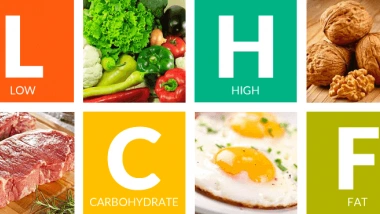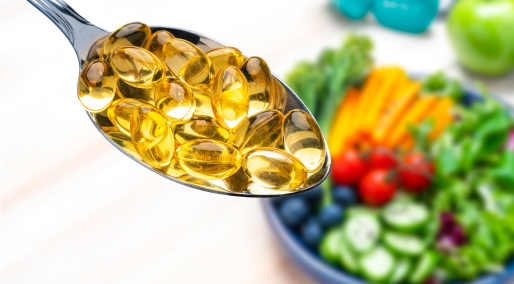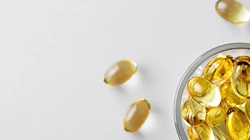.webp)
.webp)

Patryk Chodyniecki
Patryk Chodyniecki
Patryk Chodyniecki
Date Added: 14-12-2021
Update date: 20-09-2024
Update date: 20-09-2024
Oxidative stress
Oxidative stress is an imbalance between free radicals and antioxidants in your body. Free radicals are oxygen-containing molecules with an odd number of electrons. An odd number allows them to easily react with other molecules. Free radicals can cause large chain chemical reactions in your body because they react so easily with other molecules. These reactions are called oxidation. They can be beneficial or harmful. Antioxidants are molecules that can donate an electron to a free radical without becoming unstable. This causes the free radical to stabilize and become less reactive.
Contents
Oxidative stress is an imbalance between free radicals and antioxidants in your body. Free radicals are oxygen-containing molecules with an odd number of electrons. An odd number allows them to easily react with other molecules. Free radicals can cause large chain chemical reactions in your body because they react so easily with other molecules. These reactions are called oxidation. They can be beneficial or harmful. Antioxidants are molecules that can donate an electron to a free radical without becoming unstable. This causes the free radical to stabilize and become less reactive.
What effect does oxidative stress and excess free radicals have on our body? You can read about it in the following article!
What effect does oxidative stress and excess free radicals have on our body? You can read about it in the following article!
The impact of oxidative stress and free radicals on the body
Oxidation is a normal and necessary process in your body. On the other hand, oxidative stress occurs when there is an imbalance between free radical activity and antioxidant activity. When functioning properly, free radicals can help fight pathogens. Pathogens lead to infection.
When more free radicals are present than can be balanced by antioxidants, free radicals can begin to damage the fat tissue, DNA and proteins in your body. Proteins, lipids and DNA make up and build up a large part of your body, so damage to them can lead to a huge number of diseases over time. Diseases caused by oxidative stress can include:
When more free radicals are present than can be balanced by antioxidants, free radicals can begin to damage the fat tissue, DNA and proteins in your body. Proteins, lipids and DNA make up and build up a large part of your body, so damage to them can lead to a huge number of diseases over time. Diseases caused by oxidative stress can include:
- diabetes
- atherosclerosis,
- inflammation
- high blood pressure, also known as hypertension
- heart disease
- neurodegenerative diseases such as Parkinson's and Alzheimer's
- leading to the development of cancer
- leading to the development of lung diseases
- urinary diseases.
- damage to protein molecules
Oxidative stress also contributes to aging.
How to act on free radicals and eliminate the causes oxidative stress
Exposure to free radicals and oxidative stress cannot be completely avoided. However, there are things you can do to minimize the impact that oxidative stress has on your body. The most important thing you can do is increase your antioxidant levels and reduce the formation of free radicals. One method of preventing oxidative stress is to ensure you get enough antioxidants in your diet. Eating five servings of a variety of fruits and vegetables a day is the best way to give your body what it needs to produce antioxidants. Examples of top fruits and vegetables include:
- berry
- cherries
- citrus fruit
- prunes
- dark greens
- broccoli
- carrot
- tomatoes
- olives
Other product examples dietary sources that are a source of antioxidants are:
- fish and nuts
- vitamin E
- vitamin C
- turmeric
- green tea
- melatonin
- onion
- garlic
- cinnamon
In addition to diet, other factors are also important to reduce oxidative stress. Here are some lifestyle choices to help reduce oxidative stress:
- Stress. This is associated with higher natural antioxidant levels and less damage from oxidative stress. Regular exercise has been linked to a longer lifespan, lesser effects of aging, and a reduced risk of cancer and other diseases.
- No smoking Avoid also exposure to second-hand smoke.
- Be careful with chemicals. This includes cleaning with chemicals, avoiding unnecessary exposure to radiation, and being aware of other sources of exposure to chemicals, such as pesticides used in food or gardening.
- Be environmentally conscious. Environmentally friendly initiatives such as carpooling help reduce free radical production for you and your community.
- Use sunscreen. Sunscreen prevents skin damage from ultraviolet radiation.
- Reduce alcohol consumption.
- Sleep plenty. Enough sleep is very important for maintaining balance in all body systems. Sleep affects brain function, hormone production, antioxidant and free radical balance, and many other things.
- Avoid overeating. Studies have shown that overeating and constant eating keep the body in a state of oxidative stress more often than when eating at appropriately spaced intervals and eating small or moderate portions.
Why are free radicals harmful?
Free radicals are unstable atoms that can damage cells, causing disease and aging. Free radicals are associated with aging and many diseases, but little is known about their role in human health or ways to prevent disease. Understanding free radicals requires a basic knowledge of chemistry.
Atoms are surrounded by electrons that orbit the atom in layers called shells. Each shell must be filled with a certain number of electrons. When the shell is full; electrons begin to fill the next shell. If an atom has an outer shell that is not complete, it can bond to another atom using electrons to complete the outer shell. These types of atoms are known as free radicals.
Atoms with a full outer shell are stable, but free radicals are unstable and, trying to replenish the number of electrons in the outer shell, react quickly with other substances.
When oxygen molecules split into individual atoms that have unpaired electrons, they become unstable free radicals that look for other atoms or molecules to bond with. If this happens, oxidative stress is created. Oxidative stress can damage the body's cells, leading to a range of diseases and causing signs of aging such as wrinkles.
How do free radicals damage the body?
According to the free radical theory of aging, first outlined in 1956, free radicals damage cells over time. With age, the body loses its ability to fight free radicals. The result is more free radicals, more oxidative stress, and more cell damage, leading to degenerative processes as well as an increase in the aging process.
Various studies and theories link oxidative stress caused by free radicals to the following diseases:
Various studies and theories link oxidative stress caused by free radicals to the following diseases:
- diseases of the central nervous system such as Alzheimer's and other dementias
- cardiovascular disease due to clogged arteries
- autoimmune and inflammatory disorders such as rheumatoid arthritis and cancer
- cataract and age-related vision loss
- age-related changes in appearance, such as loss of skin elasticity wrinkles, hair graying, hair loss and changes in hair structure
- diabetes
- genetic degenerative diseases such as Huntington's disease and Parkinson's disease
- stroke
- respiratory diseases
- inflammation of the body,
- accelerated aging.
The free radical theory of aging is relatively new, but is supported by numerous tests. For example, studies in rats have shown a significant increase in free radicals as the rats age. These changes coincided with an age-related decline in health. Over time, scientists modified the free radical theory of aging to focus on the mitochondria. Mitochondria are tiny organelles within cells that process nutrients to power the cell.
Studies in rats suggest that free radicals produced in the mitochondria damage substances that the cell needs to function properly. This damage causes mutations that produce more free radicals, thus accelerating the process of cell damage. This theory helps to explain aging because aging accelerates over time. The gradual but accelerating accumulation of free radicals is one explanation why even healthy bodies age and deteriorate over time. Free radical theories of aging and disease may help explain why some people age more slowly than others.
Although free radicals are produced naturally in the body, lifestyle factors can accelerate their production. The negative factors that affect free radicals are:
Studies in rats suggest that free radicals produced in the mitochondria damage substances that the cell needs to function properly. This damage causes mutations that produce more free radicals, thus accelerating the process of cell damage. This theory helps to explain aging because aging accelerates over time. The gradual but accelerating accumulation of free radicals is one explanation why even healthy bodies age and deteriorate over time. Free radical theories of aging and disease may help explain why some people age more slowly than others.
Although free radicals are produced naturally in the body, lifestyle factors can accelerate their production. The negative factors that affect free radicals are:
- exposure to toxic chemicals such as pesticides and air pollution
- smoking
- alcohol
- fried food
- sun radiation
- excessive exercise,
- harmful aromatic hydrocarbons.
These lifestyle factors have been linked to diseases such as cancer and cardiovascular disease. As you can see - oxidative stress leads to many disorders through activities that we can realistically avoid.
Antioxidants - a way to fight free radicals
Antioxidants are molecules that prevent other molecules from oxidizing.
Antioxidants are chemicals that reduce or prevent the action of free radicals. They give an electron to free radicals, thus reducing their reactivity. What makes antioxidants unique is that they can donate an electron without becoming reactive free radicals. No single antioxidant can combat the effects of every free radical. Just as free radicals have different effects on different areas of the body, each antioxidant behaves differently due to its chemical properties. However, in some contexts, some antioxidants can become pro-oxidants that grab electrons from other molecules, creating chemical instability that can cause oxidative stress.
Antioxidants are chemicals that reduce or prevent the action of free radicals. They give an electron to free radicals, thus reducing their reactivity. What makes antioxidants unique is that they can donate an electron without becoming reactive free radicals. No single antioxidant can combat the effects of every free radical. Just as free radicals have different effects on different areas of the body, each antioxidant behaves differently due to its chemical properties. However, in some contexts, some antioxidants can become pro-oxidants that grab electrons from other molecules, creating chemical instability that can cause oxidative stress.
Antioxidant foods and supplements
Thousands of chemicals can act as antioxidants. Vitamins C and E, glutathione, beta-carotene and plant estrogens called phytoestrogens are among the many antioxidants that can neutralize the effects of free radicals and support the body's defenses.
In addition, many foods are rich in antioxidants. Blueberries, citrus fruits and many other fruits are rich in vitamin C, while carrots are known to be high in beta-carotene. The soybeans found in soybeans and some meat substitutes are rich in phytoestrogens.
The availability of antioxidants in foods has inspired some health experts to advise antioxidant-rich diets. The antioxidant theory of aging has also led many companies to increase their sales of antioxidant supplements.
Research on antioxidants is ongoing. Many studies have shown the benefits of antioxidants, but the results require further research. For example, a 2007 study showed that long-term use of beta-carotene may slightly reduce the risk of age-related cognitive problems (improvement of memory, among others).
Nevertheless, it is worth using a healthy diet and lifestyle, because it will certainly allow us to keep our body in great condition for many years. Let us remember that an important cause of oxidative stress is an improper diet and exposure to chemical factors. The huge amount of chemicals in food can even damage the DNA of cells over time. Unfortunately, the aging process is also influenced by the psyche. Long-term stress generates harmful chemicals in our body. Smoking cigarettes, sleep imbalance, air pollution, environmental pollution, poor physical activity and improper diet - these are the main causes of oxidative stress. It is therefore worth buying supplements and products that will help protect us against the harmful effects of antioxidants.
.png)
In addition, many foods are rich in antioxidants. Blueberries, citrus fruits and many other fruits are rich in vitamin C, while carrots are known to be high in beta-carotene. The soybeans found in soybeans and some meat substitutes are rich in phytoestrogens.
The availability of antioxidants in foods has inspired some health experts to advise antioxidant-rich diets. The antioxidant theory of aging has also led many companies to increase their sales of antioxidant supplements.
Research on antioxidants is ongoing. Many studies have shown the benefits of antioxidants, but the results require further research. For example, a 2007 study showed that long-term use of beta-carotene may slightly reduce the risk of age-related cognitive problems (improvement of memory, among others).
Nevertheless, it is worth using a healthy diet and lifestyle, because it will certainly allow us to keep our body in great condition for many years. Let us remember that an important cause of oxidative stress is an improper diet and exposure to chemical factors. The huge amount of chemicals in food can even damage the DNA of cells over time. Unfortunately, the aging process is also influenced by the psyche. Long-term stress generates harmful chemicals in our body. Smoking cigarettes, sleep imbalance, air pollution, environmental pollution, poor physical activity and improper diet - these are the main causes of oxidative stress. It is therefore worth buying supplements and products that will help protect us against the harmful effects of antioxidants.
.png)
Bibliography:
https://www.ncbi.nlm.nih.gov/pmc/articles/PMC5551541 (dostęp 1 grudnia 2021r.)
https://www.medicalnewstoday.com/articles/324863 (dostęp 1 grudnia 2021r)
Yoshikawa, T.: A Guide to Free Radicals. Part 2. Sentan Igaku Sha, Tokyo, 1998.
Rate the text

AUTHOR
Patryk Chodyniecki
Patryk Chodyniecki
Patryk Chodyniecki
A passionate bodybuilding, swimming, and martial arts enthusiast. He has been practicing strength sports for over 10 years, alternating between boxing, MMA, and swimming, which he enjoys combining. He is also interested in the broad field of supplementation and nutrition, which he gradually implements into his training.
A passionate bodybuilding, swimming, and martial arts enthusiast. He has been practicing strength sports for over 10 years, alternating between boxing, MMA, and swimming, which he enjoys combining. He is also interested in the broad field of supplementation and nutrition, which he gradually implements into his training.
Vlog
Juice diet
Dieta sokowa - kto z nas nie spotkał się z tym terminem? Główne założenie takiego sposobu odżywiania polega na zastąpieniu…
Dietitian Tips - Supplement Suggestions
LCHF diet
Diety niskowęglowodanowe mogą pomóc w utracie wagi i wiążą się z rosnącą liczbą korzyści zdrowotnych. Zmniejszone spożycie…
Dietitian Tips - Supplement Suggestions
Założenia diety rozdzielnej
W chwili obecnej dieta rozdzielna skupia się na tym, by nie łączyć w sobie kilku rodzajów produktów spożywczych podczas…
Comments (0)








.webp)



















